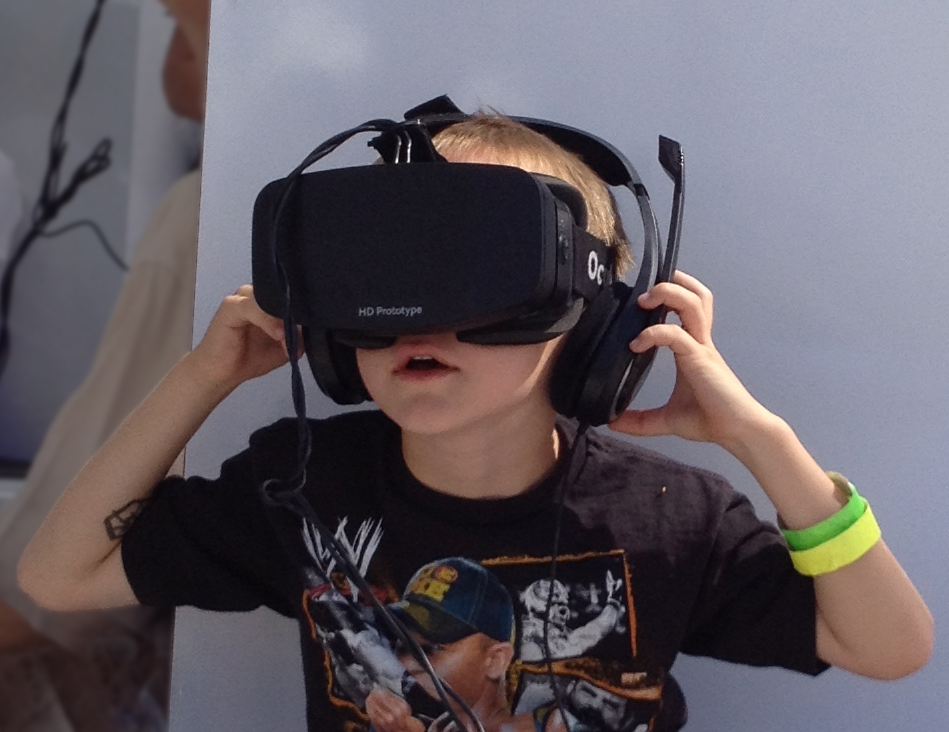Realer Than Real: Virtual Reality and a Question of Ethics
***Note: all images from Wikimedia Commons
In a VR study at Stanford University, 5-year old test subject Anna waved at her favorite children’s cartoon character.
Her entire body jumped when she saw him wave back.

This is virtual reality, a wearable headset often paired with headphones to take control of two of the user’s senses, to transport the wearer into a new video-gaming world. The Virtual Reality Society gives a brief history of the device that led up to our modern VR headwear. The site details the early attempts at viewing devices since the wood-and-metal 1800s French “Polyorama Panoptique” device, to the failed Nintendo Virtual Boy headset of the 1990s.
The most common VR device is the Oculus Rift— funded by a Kickstarter campaign and now commercially viable at only $400 (compared to nearly $1000 per system at its outset). Coming in as a newer “hot item” is the more affordable HTC Vive that works much the same. The gaming device includes a set of goggles to “see” into the virtual world, a pair of headphones for hearing immersion, and finally, a set of “hands”/ virtual controls for moving around, the Razer Hydras.
Of course, as anything new in tech, now that it’s gaining recognition, there’s also fear surrounding it. The New Yorker reported of users who played a Japanese horror game called The Kitchen. The game really is quite terrifying, with a sea of cadavers on the bottom of the player’s eyesight. It’s like a virtual haunted house that only you experience. But this article asks a more philosophical question. If VR can be used for good, to treat PTSD or anxiety, can it also be used for psychological harm, like in the case of a horror game… where it’s no longer a game? Where it supports violence or other “mimicry of perils”, as the article goes on to say, “one can put down a book, but you can’t escape VR so easily.”

A CBC radio transcription questions the ethics behind VR, less so about haunted houses and fear-mongering, and more about the sincere morality behind it. It focuses more on the positives behind the budding tech. VR used to improve human psyche in good ways: to reduce instances of racism and decrease bias. Philosopher Michael Madary speaks to the CBC team on his work, explaining how he had test subjects walk around in an avatar’s body, an avatar who possessed a different cultural and ethnic identity than the user. Madary’s study used both VR, and Harvard’s Implicit Racial Bias test, where the viewer clicks on faces on a computer screen, their quick responses judging whether they score more favorably towards white or minority photos onscreen. When the user in Madary’s study then took off the VR headset and retook the Implicit Racial Bias Test, they scored less biased than before they entered the VR reality.
Health Guidance equally takes an optimistic viewpoint with VR, suggesting its uses to create immersive environments for educational learning (painting in a 3D world, exploring historical battle scenes with famous historical figures, or walking through digital buildings designed in your architecture classes). But it might also trick the brain into forgetting what reality is, really. Would we, the article speculates, feel less fear when near the edge of a cliff? Will we be numb to ideas of self-preservation? Will we forget that, though we have thousands of lives in a game, that real life provides only one?
Finally, the Guardian continues on the vein of mental health, and how VR can best improve it. It goes on to suggest what medical experts in fields of psychology speculate VR can help with. For PTSD, can VR recreate experiences from the patient’s past, to help ease them through it? For phobias due to flying or crowds, would VR help the patient get over their fear, to move past it? For small case studies, VR has been shown to treat anorexia and body dysmorphia when patients walked around in avatars and were detached from their own image. VR has also helped for certain studies in depression, nurturing feels of compassion-towards-self in care taking digital environments. In a world where mental health is so crucial, but resources are so limited, is VR the answer? And, finally, even if VR recreates potentially fearsome experiences, the user can just take off the headset. Patients can handle as small doses of their fear as necessary, constantly reminded it’s just virtual, that their fears can be overcome, in time, just as safely.

In a future where VR can recreate multiple realities, where any number of scenarios can just appear...
In a future where architects can build houses without having to lift a single brick, where artists can sculpt without having to craft stone…
In a future where technology can be both utilized, or abused….
What will you pick?
What will become your new reality?


Recent Comments